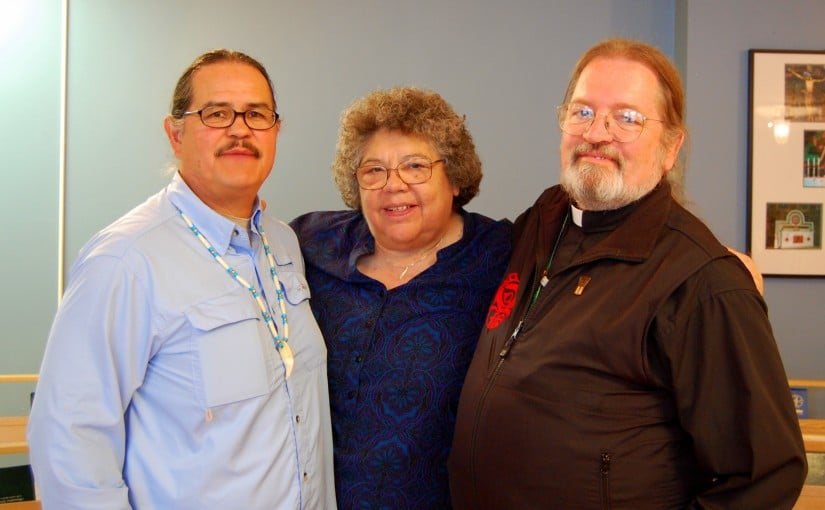The community at Church House was recently treated with the gift of a visit and teaching from Steven Darden, a well-known Navajo philosopher and Chair of the Navajo Human Rights Commission. His talk, “Indigenous Rights in the Four Directions,” wove together reflections on the interconnectedness of all creation, stories from his youth, and insight into current human rights challenges facing the Navajo Nation. Raised primarily by his grandmother, Mr. Darden credited his wisdom to her. “I’m just a tongue, a mouthpiece for the grandmother’s teachings.”
A close friend of National Indigenous Anglican Bishop Mark MacDonald, whom he calls brother, Darden said the struggle for Indigenous rights looks much the same in Canada and the United States. In particular, he stressed the centrality of the principle of free, prior, and informed consent (FPIC) in protecting basic rights of Indigenous peoples. When he considers the four words that make up this principle – free, prior, informed, consent – Darden hears the four directions, which references an Indigenous holistic understanding of body, mind, heart, and spirit.
The number four emerges again in Darden’s life in struggles to protect Navajo sacred sites and religious freedom. The Navajo Nation is situated between four sacred mountains to the north, south, east, and west. The sacred mountain of the west, San Francisco Peaks or Abalone Shell Mountain, is also home to a ski resort that uses effluent, or recycled wastewater, for snowmaking. Both Hopi and Navajo nations have filed lawsuits again the practice and further development at the site, however the U. S. Supreme Court ended the appeals process in favour of the resort.
A 2006 shooting of a Navajo man at a Farmington, New Mexico Walmart was the precipitating event for the formation of the Navajo Nation Human Rights Commission. The NNHRC works at all levels of government on Indigenous rights relating to sacred sites, discrimination and acts of violence in towns bordering Navajo lands, missing and murdered women, among other issues. Darden, a former City of Flagstaff judge, said he came to serve the commission after “much prayer and supplication.” Despite mixed reception to the Commission from non-Indigenous people, Darden is heartened that justice is taking hold through a number of recent victories. He names recent convictions and settlements for hate crimes committed against Navajo people as examples where the Commission’s work has had some success.
In all that he does, Darden draws on the strength of relationships to sustain him. He is deeply grateful for his grandmother’s guiding wisdom, the presence of elders who share with him “things you could never learn in college,” and for his dear friend and brother Bishop MacDonald who joins him in a “congruent dance” that brings them together every so often for times of fellowship like this.
Interested in keeping up-to-date on news, opinion, events and resources from the Anglican Church of Canada? Sign up for our email alerts .

